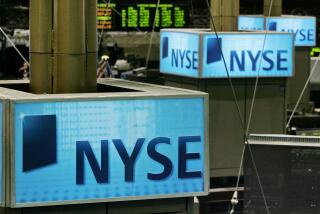MARKET BEAT / TOM PETRUNO : Foggy Vision May Distort Values in Stock Market
- Share via
The nation’s corporate executives evidently see incredible value in stock prices at current levels, because they’re buying like crazy. But some Wall Streeters worry that this corporate group-think about stocks constitutes a delusion of dangerously grand proportions.
Put it this way: If we’re in the early stages of a bear market, the same executives who think stocks are cheap now will be stunned to realize later that they overpaid. So, too, will their shareholders be stunned--and it’s their money, mostly, that the executives are using to buy.
Three trends show how undervalued Corporate America believes the stock market is today:
* Not only are takeovers booming again, but they’re mostly being funded with cash--a sign that the corporate buyers believe their own shares aren’t being valued highly enough by Wall Street to justify using them as “currency.”
Deals tracker Securities Data Co. of Newark, N.J., says $64 billion in all-cash takeovers were announced between Jan. 1 and July 14. In contrast, takeovers funded mostly through exchanges of stock totaled $33 billion in that period. Compared to the same period of 1993, announced all-cash deals are up 64% this year, while announced stock swaps are up just 25%.
* Companies are authorizing buybacks of their own shares at a pace not seen in five years, Securities Data says. So far this year, 479 companies have announced plans to buy back up to $29.5 billion worth of their stock on the open market. That’s an annualized pace of $53.3 billion, which would make 1994 the biggest buyback year since $61.9 billion worth were announced in 1989.
*
An announcement of a buyback, of course, doesn’t necessarily mean a company will follow through; in any case, buybacks usually are executed over long periods, not all at once. Still, the message of a buyback declaration is that management believes its own shares may be the best investment the company can make with its cash--over and above other potential uses, such as plant expansion or product development.
* Open-market stock purchases by corporate insiders--of their own companies’ shares--have recently been running at the highest level in two years, says the Insiders newsletter of Ft. Lauderdale, Fla.
Heavy insider buying at the same share prices the public would pay (versus below-market-price options buying) is considered a sure sign that execs believe their stocks are dirt cheap. And in theory, they should know best how to value their own shares, because they should know their companies’ earnings prospects better than anyone.
Well, maybe. But some experts caution that just because Corporate America sees value all over Wall Street doesn’t necessarily mean it’s so.
Indeed, some analysts believe bruised egos loom large in this equation. After three years of steadily rising stock prices, this year’s “correction” in the market has been greeted with as much disbelief by executives as by novice investors. Business is good, and corporate earnings are the best since the late 1980s for many firms. So why should stocks be going down? Just because of an arguably minor rise in interest rates?
“I think every executive scratches himself and thinks, ‘My stock is cheap,’ ” says David Shulman, strategist at Salomon Bros. in New York.
Yet Shulman notes that after a long bull market in any given asset, there is always widespread disbelief when prices begin to decline. Think of commercial real estate in the late 1980s, just before that market crashed, he says. “Everybody thought their buildings were worth so much”--and certainly no less, if not necessarily more.
Katherine Hensel, strategist at Lehman Bros. in New York, notes that executives’ insistence that their stocks are cheap flies in the face of a powerful indicator of stock value: the so-called Q-ratio, which is companies’ gross market value divided by the estimated replacement cost of their assets. When that ratio is over 1.0, Hensel notes, the smart decision generally is to build assets, not buy them on the floor of the New York Stock Exchange.
The current market Q-ratio is 1.2, Hensel says--the highest since 1968. Caveat emptor?
Buyback Mania
Corporate stock buyback announcements have surged this year, and the dollar value of announced buybacks us the highest since 1989, if the year-to-date pace is annualized. Full-year and 1994 annualized figures, in billions of dollars.
1994 (Year-to-date pace, annualized): $53.3
Source: Securities Data Co.
More to Read
Inside the business of entertainment
The Wide Shot brings you news, analysis and insights on everything from streaming wars to production — and what it all means for the future.
You may occasionally receive promotional content from the Los Angeles Times.










